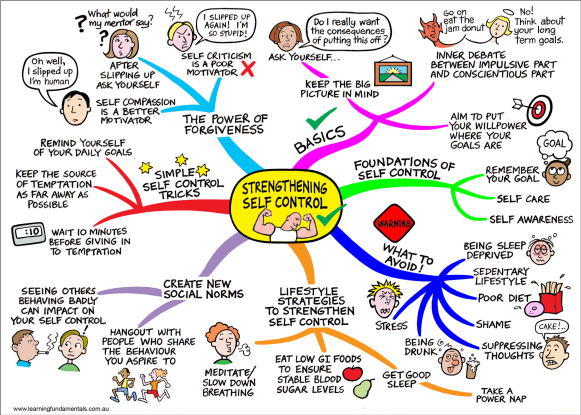There’s a place in Texas called Kenny’s Burger Joint. It’s a pretty typical burger place all but for one little..I mean BIG thing: The 7,000 calorie El Jefe Grande burger on the menu.
Before you can order this burger you need to sign a legal waiver. This actually is a good thing as it gives you an opportunity to think carefully about the potential consequences of eating a 7,000 calorie burger. In other words, it allows you to exercise your self control muscle to make a healthier choice!
And we can all do this. As mentioned in part 1 of this self control blog series, we simply need to keep the big picture in mind and consider the consequences (e.g. obesity) of engaging in the short term gratifying behaviour.
But that’s not all you can do to enhance your willpower. Research also shows that you can have better self control and make better decisions if you live a healthier lifestyle.
So how can you strengthen your self control in this way?
In a nutshell: get good sleep, eat well, exercise regularly, keep your stress levels down and choose your friends wisely.
If you’re hungry, have some protein as studies have found willpower gets depleted when you’re low on glucose. Eat foods that are as close to their natural state as possible.
If you’re only getting 6 hours of sleep a night then you’re not operating with full willpower reserves. You see, it’s harder to resist temptation and you’re more susceptible to stress when you’re tired. Being sleep deprived also makes it more difficult to focus, control your emotions and tackle challenging tasks. If you’re running short on sleep, take a power nap.
Exercise is a quick and easy way to boost your willpower reserves. Even just 5 minutes of walking can do the trick. Dr Kelly McGonigal from Stanford University states –
“the willpower benefits of exercise are immediate. Fifteen minutes on a treadmill reduces cravings, as seen when researchers try to tempt dieters with chocolate and smokers with cigarettes. The long term effects of exercise are even more impressive. It not only relieves ordinary, everyday stress, but it’s as powerful an antidepressant as Prozac”
 Meditation is also a great way to improve a range of self control skills such as the ability to focus and pay attention. Again, even just 5 minutes of meditation a day will keep your stress levels down, which is vitally important for maintaining self-discipline.
Meditation is also a great way to improve a range of self control skills such as the ability to focus and pay attention. Again, even just 5 minutes of meditation a day will keep your stress levels down, which is vitally important for maintaining self-discipline.
They say stress is the number 1 factor that can make it difficult to maintain self control. Dr Kelly McGonigal states-
“Nothing drains willpower faster than stress”
So whether it’s exercise, meditation or a massage, find ways that work for you to de-stress.
 In addition, don’t suppress thoughts of temptation. Often when we try to avoid engaging in a certain activity such as eating cake we attempt to push the thought out of our minds.
In addition, don’t suppress thoughts of temptation. Often when we try to avoid engaging in a certain activity such as eating cake we attempt to push the thought out of our minds.
Ironically, the more you try and eliminate the thought, the more likely it is going to dominate your mind and thoughts (This idea is called The Rebound Effect).
You’ll be better off simply observing the thought for a moment, accepting it and noticing what feelings it brings up for you.
It also helps to spend time with people who lead healthier lifestyles and have good self control. For example, have you ever been at a party and seen other people pigging out on food and somehow justified it to yourself that it was OK for you to pig out too?
When we see and even just hear evidence of bad behaviour, this can lead to our willpower reserves being depleted.
The social norm can also mess with our minds and behaviour. For instance, if most people around you don’t exercise, then it’s likely you may think “I’m doing OK. I’m just like everyone else”. When the reality is that it’s not OK. You and the people around you are in trouble. Why? Because the global recommendation by the World Health Organisation is as follows –
“Children and youth aged 5–17 should accumulate at least 60 minutes of moderate- to vigorous-intensity physical activity daily…Adults aged 18–64 should do at least 150 minutes of moderate-intensity aerobic physical activity throughout the week or do at least 75 minutes of vigorous-intensity aerobic physical activity throughout the week or an equivalent combination of moderate- and vigorous-intensity activity.”
Now how many people do you know who would do this amount of exercise?
Personally, I don’t know many.
 Now on most weeks I manage to do the recommended 150 minutes of moderate intensity physical exercise and I’m often labelled a “gym junkie”. But I’m just doing the bare minimum! This just goes to show how the social norm of inactivity can mess with our minds and behaviour.
Now on most weeks I manage to do the recommended 150 minutes of moderate intensity physical exercise and I’m often labelled a “gym junkie”. But I’m just doing the bare minimum! This just goes to show how the social norm of inactivity can mess with our minds and behaviour.
So the solution is simple: spend time with people who engage in the behaviours that you want to adopt. This why support groups, online forums and clubs can be so effective: they help you to create a new social norm.
If you can start to take better care of yourself through doing simple things, such as getting regular sleep and keeping your stress levels down, this will make a difference to your willpower reserves. You will be able to focus on what you need to do more effectively. You will also be in a better position to fight off any temptations or distractions that come your way.


2 thoughts on “Strengthen your self control through a healthier lifestyle: Part 2”
With so much other media coverage on diets, exercise & wellbeing, Jane’s masterstroke is to pare the essentials down to the Musts! Thanks Jane!
Thanks Linda! Hope you found the post useful 🙂
Comments are closed.